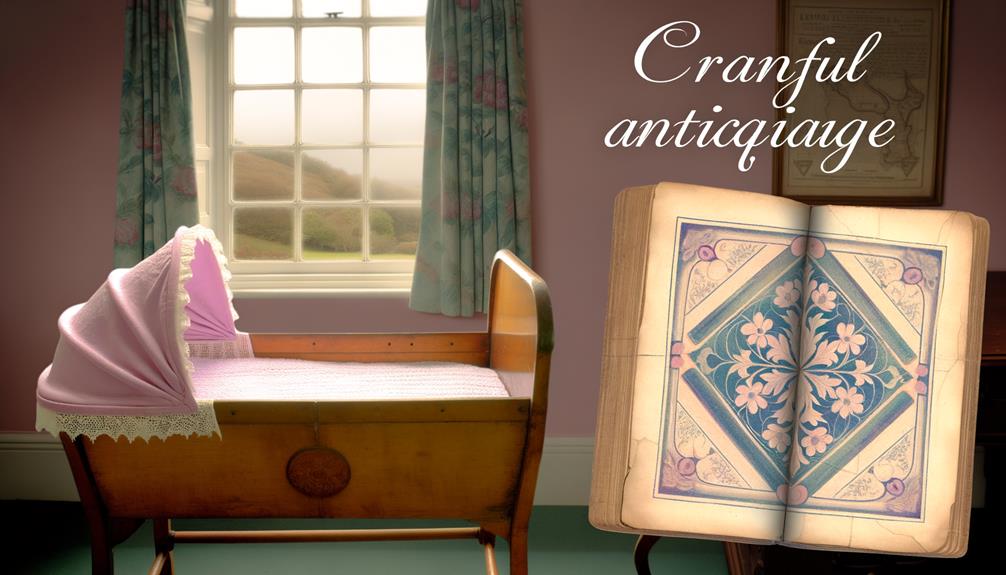Darcy Name Meaning and Origin
The name Darcy has deep historical roots dating back to the Norman Conquest of England in 1066. It originates from the Norman French surname d'Arcy, which denotes a connection to the village of Arcy in La Manche, Normandy.
The name is derived from the Gallo-Roman personal name Arsius, combined with the locative suffix -acum. The Darcy family held significant influence in England, gaining distinction in baronial roles and military leadership.
The name regained prominence in the 19th century, partly due to Jane Austen's iconic character Fitzwilliam Darcy. Its evolving popularity reflects broader societal changes, offering more insights into its enduring legacy.

Key Takeaways
- Darcy originates from Norman French d'Arcy, indicating a connection to the village of Arcy in Normandy, France.
- The name Darcy is rooted in the Gallo-Roman personal name Arsius combined with the locative suffix -acum.
- The Darcy family gained prominence post-Norman Conquest with significant roles in England's baronial and military leadership.
- Popularity surged in the 19th century due to Jane Austen's 'Pride and Prejudice' and revived in late 20th century through media adaptations.
- Darcy has become a popular unisex name reflecting broader societal shifts towards inclusivity and non-binary options.
Historical Roots
The name Darcy has its historical roots in the Norman Conquest of England in 1066, signifying a lineage deeply intertwined with medieval European nobility. Originating from the Norman French d'Arcy, it denotes a geographic connection to the village of Arcy in La Manche, Normandy.
Following the conquest, Norman knights and nobility, including those bearing the Darcy name, were granted lands and titles in England, embedding themselves into the socio-political fabric of the era. Historical records indicate that the Darcy family held significant influence, with members serving in various capacities, including baronial roles and military leadership.
This integration into English aristocracy reflects the broader impact of Norman governance on England's feudal system and societal structures.
Etymology of Darcy
The name Darcy originates from the Old French surname d'Arcy, which itself is derived from the Norman toponym Arcy, a village in La Manche, Normandy.
Historical records indicate its usage dates back to the Norman Conquest of England in 1066, where it was adopted by Normans settling in Britain.
Linguistic analysis reveals that the name is rooted in the Gallo-Roman personal name Arsius, combined with the locative suffix -acum, indicating ownership or association with land.
Linguistic Roots Analysis
Rooted in Norman-French history, the name Darcy originates from the Old French surname d'Arcy, which denotes a person from the town of Arcy in France's Yonne department.
The prefix 'd'' signifies 'of' or 'from,' indicating geographical lineage. Arcy itself may derive from the Latin 'Arciacus,' a combination of a personal name and the suffix '-acus,' which denotes belonging. This etymological foundation underscores the name's geographic and cultural significance in medieval France.
Over time, the name evolved phonetically and orthographically, adapting to various linguistic contexts. This evolution reflects broader historical shifts, such as the Norman Conquest, which facilitated the name’s introduction to the British Isles, embedding it within English nomenclature. Today, the name Dwyer can be found in various English-speaking countries, as well as in Ireland, where it has retained its Gaelic roots. Those interested in the history and significance of the name can learn more about Dwyer by researching its etymology and tracing its migration patterns throughout history. By studying the evolution of the name, individuals can gain a deeper understanding of its cultural and historical significance.
Historical Name Usage
Throughout centuries, the name Darcy has been borne by numerous notable figures, each contributing to its rich historical tapestry and embedding it deeply within various cultural and social contexts. Originating from the Norman French 'd'Arcy,' the name signifies 'from Arcy,' a location in France. Historical records reveal several influential individuals:
- Thomas Darcy, 1st Baron Darcy de Darcy: A prominent English nobleman during the Tudor period, known for his role in the Pilgrimage of Grace.
- Patrick Darcy: A 17th-century Irish lawyer and political figure who played a key role in the Confederate Ireland movement.
- Fitzwilliam Darcy: The iconic character from Jane Austen's 'Pride and Prejudice,' symbolizing the name's enduring literary significance.
These exemplars highlight Darcy's historical and cultural resonance.
Geographic Origins
Deriving from the Norman-French surname d'Arcy, the name Darcy has historical roots that trace back to the region of Arcy in northern France.
The etymology of d'Arcy is closely linked to the geographical location in the modern-day department of Yonne, within the historical province of Burgundy. This region was known for its strategic importance during the Norman conquests.
The name d'Arcy originally denoted someone who hailed from this area, encapsulating both a sense of place and lineage.
Following the Norman Conquest of England in 1066, the name made its way to the British Isles, leading to its establishment within English nobility. This cross-channel migration further solidified Darcy's standing in both French and English heritage.
Darcy in Literature
The name Darcy is most famously associated with the character Fitzwilliam Darcy from Jane Austen's 1813 novel 'Pride and Prejudice,' where it symbolizes themes of pride, social class, and moral growth.
In literature, characters bearing the name Darcy often embody complexity and depth, serving as focal points for exploring intricate human emotions and societal critiques.
This literary legacy underscores the name's enduring cultural significance and its role in shaping narrative archetypes.
Iconic Literary Characters
Fitzwilliam Darcy, the enigmatic and brooding protagonist of Jane Austen's 'Pride and Prejudice,' has become an enduring symbol of complex romantic heroes in literature. His character embodies a multifaceted blend of pride, vulnerability, and moral integrity, contributing to his lasting appeal.
Darcy's significance can be understood through:
- Character Development: His transformation from aloof aristocrat to devoted partner highlights personal growth and redemption.
- Social Commentary: Darcy's interactions with Elizabeth Bennet provide insight into class dynamics and societal expectations of the Regency era.
- Cultural Impact: The character's portrayal in numerous adaptations underscores his influence in popular culture and literary studies.
Darcy's enduring legacy continues to captivate readers, making him a quintessential figure in literary discourse.
Symbolism and Themes
Examining the symbolism and themes associated with Darcy in literature reveals deeper layers of his character, particularly through the motifs of social class, personal pride, and moral integrity that pervade Austen's narrative.
Mr. Fitzwilliam Darcy from 'Pride and Prejudice' epitomizes the complexities of 19th-century British aristocracy. His initial portrayal as aloof and prideful underscores the rigid class distinctions of the era. However, as the story unfolds, Darcy's actions demonstrate a profound sense of moral integrity and personal growth, challenging societal expectations.
His ultimate union with Elizabeth Bennet symbolizes the transcendence of social barriers and the triumph of genuine affection over superficial judgments. Consequently, Darcy serves as a nuanced representation of evolving social mores and individual redemption in Austen's work.
Popularity Over Time
Darcy's popularity as a given name has experienced significant fluctuations over the decades, influenced by cultural trends, literary references, and historical events. Initially, the name saw a rise in the 19th century, particularly due to its association with Jane Austen's 'Pride and Prejudice.' However, its popularity waned in the early 20th century, only to see a resurgence later.
Key points include:
- 19th Century Surge: Popularized by literary works, especially Austen's Mr. Darcy.
- Mid-20th Century Decline: Shift towards more modern and less traditional names.
- Late 20th to Early 21st Century Revival: Renewed interest driven by media adaptations and a broader acceptance of unisex names.
This historical ebb and flow reflect broader societal influences on name trends.
Gender and Usage
The name Darcy has evolved in its gender usage over time, shifting from a mainly male name in the 19th century to a widely accepted unisex name in contemporary society.
Historically, Darcy was primarily used for boys, particularly influenced by literary figures such as Mr. Darcy from Jane Austen's 'Pride and Prejudice.' However, the latter half of the 20th century saw a significant shift as the name gained popularity among girls.
This change is attributed to evolving societal norms and the growing trend of gender-neutral naming conventions. Today, Darcy is embraced by parents for both sons and daughters, reflecting a broader cultural movement towards inclusivity and the fluidity of gender identity in naming practices.
Famous People Named Darcy
Among the notable individuals bearing the name Darcy is Darcy Bussell, a celebrated British ballerina and former principal dancer with the Royal Ballet. Her influence in the world of ballet is profound, having graced numerous stages worldwide and contributing significantly to the arts.
Other distinguished personalities named Darcy include:
- Darcy Tucker – A retired Canadian professional ice hockey player known for his tenure with the Toronto Maple Leafs.
- Darcy Kuemper – A prominent Canadian ice hockey goaltender playing in the National Hockey League (NHL).
- Darcy Oake – A Canadian illusionist recognized for his engaging performances and appearances on television shows like 'Britain's Got Talent.'
These individuals illustrate the diverse fields in which those named Darcy have excelled, from athletics to the performing arts.
Cultural Significance
Rooted in literature and history, the name Darcy carries significant cultural weight, particularly through its association with Mr. Fitzwilliam Darcy, a central character in Jane Austen's classic novel 'Pride and Prejudice.' Published in 1813, the novel has entrenched Darcy in the cultural lexicon as the epitome of the brooding, aristocratic hero whose initial pride masks deep integrity and loyalty.
Beyond literature, the name Darcy also finds historical prominence in Anglo-Norman heritage, with its origins tracing back to the 11th-century Norman Conquest of England. The name derives from the French d'Arcy, meaning 'from Arcy,' a place in La Manche, Normandy.
This dual literary and historical significance endows the name Darcy with a rich cultural tapestry, resonating across generations.
Modern Interpretations
In contemporary times, the name Darcy continues to evolve, often embraced for its timeless elegance and gender-neutral appeal. This shift reflects broader societal changes towards inclusivity and the breaking down of traditional gender norms.
Historically, Darcy has been associated with aristocratic lineage, particularly in Irish and English contexts. However, its modern usage reveals several key trends:
- Unisex Popularity: Darcy has seen a rise in popularity as a unisex name, appealing to parents seeking non-binary options.
- Literary Influence: The enduring legacy of characters like Mr. Darcy from Jane Austen's *Pride and Prejudice* maintains its literary prestige.
- Cultural Adaptability: Darcy's phonetic simplicity allows for easy adaptation across different languages and cultures, enhancing its global appeal.
This analysis highlights the name's dynamic evolution.
Conclusion
The name Darcy, with its profound historical roots and rich etymological tapestry, transcends mere nomenclature to embody a cultural legacy of immense significance.
Its geographic origins and literary prominence, particularly through characters like Mr. Darcy in Jane Austen's 'Pride and Prejudice,' elevate it to an almost mythical status.
The name's sustained popularity and diverse gender usage reflect its timeless appeal.
Famous bearers of the name further cement Darcy's unparalleled cultural resonance, making it a symbol of enduring legacy and profound identity.






